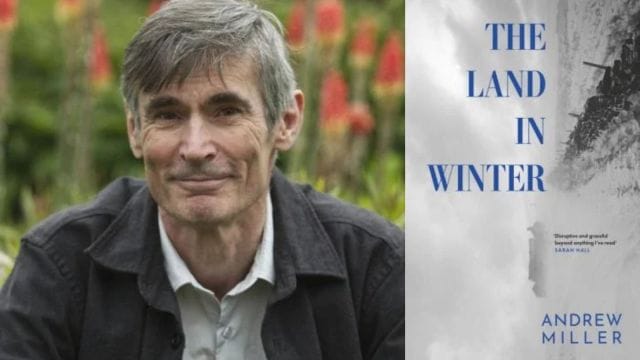Booker Prize 2025: Andrew Miller’s Land in Winter — a tender portrait of survival, love and loneliness in the Big Freeze
Set amid Britain’s 1962 blizzard, Land in Winter explores fragile marriages, buried guilt, and quiet resilience, revealing how isolation and extreme weather expose the heart’s deepest truths.
 Author Andrew Miller's novel Land in Winter captures love, loss, and resilience amid Britain’s 1962 Big Freeze. (bookerprizes.com)
Author Andrew Miller's novel Land in Winter captures love, loss, and resilience amid Britain’s 1962 Big Freeze. (bookerprizes.com)On December 22, 1962, a 36-hour blizzard swept through large parts of the UK. There was no let-up in the bad weather for more than two months. It snowed almost incessantly till March 8th the next year. Rivers, lakes and even parts of the sea froze; more than 90,000 miles of road were covered in snow. Andrew Miller’s Land in Winter frames the predicaments in the lives of his central characters — two couples — against the backdrop of this “Big Freeze.”
In more ways than one, all four are troubled characters. Bill has had an urbane upbringing but has taken to farming, having given up on his father’s — an immigrant of Eastern European origin — dubiously acquired money. He nurtures ambitions to turn his dairy and poultry-based farm into a larger venture.
Work on the farm is hard and involves long hours. He is industrious but often seems short on ideas, especially when problems not foreseen by the novice farmer show up — a recalcitrant bull, for example. And then, Bill’s elite school accent doesn’t win him many friends in his adopted community.
His wife, Rita, is cheerful and lively at times and withdrawn at others. Sci-fi and half-hearted attempts at cooking are refuge from the demons in her mind, some of which owe to a past in dodgy Bristol bars. One morning, she crosses the field across the farm with a basket of eggs, in an attempt to silence the voices in her head, and strikes an unlikely friendship with Irene, who, like her, is pregnant.
Improbable connections
To begin with, it appears a spontaneous bond between two women due at about the same time, but as skeletons come out of the closet in the frigid weather, the two make improbable connections and the warmth in their friendship increases.
Irene’s husband, Eric, is one of the two GPs in the area. Work keeps him busy, as does an affair with one of his patients — an affair he wants to end but doesn’t know how to. Eric is also given to self-doubt, not just about the way he has handled relationships but also whether he has done justice to his patients. Irene aspires to be a “perfect wife,” striving to make a comfortable home, but her husband is often detached.
The differences in their backgrounds — she is resolutely middle class while Eric, who grew up in the Western County, is still unsure of the ways of the “smarter suburb” despite his medical education and professional status — create uneasiness in their relationship, despite moments of tenderness and affection. Rural life offers little to Irene, who spends most of her time planning a Christmas party.
The Holocaust and World War II have an unsettling presence in the lives of these two families. An asylum looms over much of the novel. A social churn is also underway. But it’s the harsh winter that seems to have the most say over what happens in Land in Winter.
 Deep snow near Burrow-with-Burrow, Lancashire, England, January 1963.
Deep snow near Burrow-with-Burrow, Lancashire, England, January 1963.
Looking inward
Unexpressed marital and social complications come to the fore as the snow cuts off communication links, forcing an already isolated community to become even more inward-looking. When little is happening outside, the turmoil in the lives of the four becomes sharper; unspoken resentments surface.
Yet, fragility in relationships rarely gives way to rancour. Miller’s prose isn’t judgmental; he brings tenderness to the unravelling of emotions amid a bleak landscape, crafting every sentence with scrupulous sensitivity and inviting empathy for all his characters.
In several ways, the Big Freeze was the precursor of extreme weather events in the climate change era. Relentless heat or cold has social consequences. Unravelling them is the work of social scientists. But how to map the intricacies of human behaviour during erratic weather? The fiction writer is, perhaps, best suited for that task. The storyteller’s account might be less definitive than the diagnosis of climate experts. Land in Winter, for example, is imbued with a sense that, just like the bad weather, difficulties in relationships will also pass. That may not always be right. But as the writer Rebecca Solnit has said, such stories enable us to become better listeners, better critics — they invite us to be more attentive to the ways in which people live through tough times.
That’s why Land in Winter is a meditation par excellence — not just on human relationships, but on people’s resilience in hard times.



- 01
- 02
- 03
- 04
- 05




























